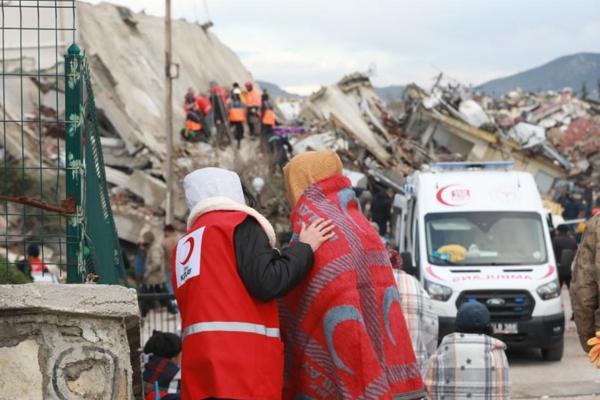Psychologists try to heal mental wounds in quake-hit region
KAHRAMANMARAŞ


Many expert psychologists on duty and volunteers in the quake-hit region are trying to help earthquake victims to get over the trauma by treating their mental wounds.
While rescue efforts are still ongoing after more than a week has passed since the devastating tremor, it is also important to look after the mental well-being of survivors to help them continue their lives as before.
Following the major earthquakes that hit the country’s south on Feb. 6, many mental health experts share the pain of victims in the region and try to heal their mental wounds.
“Major disasters make victims feel that nothing is certain and that they can lose everything. By standing side by side, joining hands for solidarity, we can become stronger and give them strength,” said Cem Taylan Erdem, a psychiatrist working in the quake-hit region.
“We cannot release the grief of mourners with just beautiful words, but we need to say that we stand by them and give strong messages in this direction. Trauma hurts people, but if we treat it well and respond appropriately, we can heal that wound,” he added.
Psychologist Aişe Sümeyye Dal also pointed out that it is wrong to talk in the presence of children about tragic details about those who lost their lives as it can leave a deeper impact on their minds.
“We apply psychological first aid with our colleagues in the region as children have symptoms such as intense anxiety, decrease in daily activities, sleep and eating problems, regression to previous age periods, and irritability.”
If children do not receive support and a safe space is not created for them in the post-quake period, several different psychological disorders may arise in the following years, Dal warned.
Victims may have depression, anxiety and post-traumatic stress disorders, especially after six months following the disasters, she informed.
“Most people are frightened and have high levels of anxiety as they are in shock and emotionally unresponsiveness, while some are even still waiting for their relatives trapped under the rubble,” said Sait Ali Nur, an expert from the Turkish Red Crescent, adding that he can also observe that they are alienated from reality.
“They give startle reactions to the sounds they hear around them, and they have tantrums from time to time. Sometimes they don’t even remember what they’ve been through.”
The important thing is to support their psychological resilience and adaptation as the effects of bereavement and post-traumatic stress disorder can last for years, he noted.
“Support is essential for children to go through this process in the healthiest way possible. The first thing that should be done for them is to prepare a safe shelter environment by meeting their basic needs.”
The expert also stressed that parents should explain without going into details that an earthquake is a natural event and answer their every question.
Instead of teaching such as “don’t be afraid” or “don’t cry,” parents should educate their children about earthquakes and the need to stay alert and practice caution in such times.
